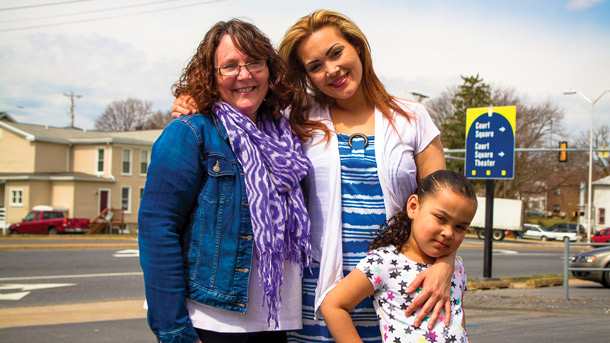Ann Yoder, class of 1961, has tapped her real-estate career experience to locate housing for the single mothers and their children assisted by Bridge of Hope Harrisonburg-Rockingham.
For those families, “housing comes first,” said Yoder, one of several alumni who have served on the program’s board. “Then, the heart of the program is surrounding a single mother who is at risk of being homeless with a support group of mentors.”
To Kathryn Fairfield ’70, her Bridge of Hope board service and fundraising mean applying her faith to helping children: “I’m a lawyer and mediator, and my career has really given me a heart for the children.” She’s seen the difference a home and stable family income make toward a child’s future.
The program provides a single mother at risk of becoming homeless with a “mentoring group” for up to two years, along with assistance from two part-time program directors, both social workers, said Stephanie Resto ’89, who is one of the two.
She and her colleague assist with housing, job placement, money management and parenting skills. A mentor’s job, Resto said, is to be a friend to the single mother. Currently there are seven staff-trained, cross-generational mentoring groups from various local churches. Mentors and moms gather monthly for a Bridge of Hope night that may be “just fun” or include guest presentations on such topics as cooking or car care. Mentors themselves benefit, said Yoder, who feels a congregation “ought to be a lot more outside of the walls of the church.”
Anna Wyse ’95, a public health nurse and recent board member, sees the program’s strength as building relationships: “That’s the beauty of it. It’s not a quick fix. It really changes lives and it’s not a band-aid approach.”
A 2013 “point-in-time” survey found 94 adults and 39 children homeless in Harrisonburg and Rockingham County, Fairfield said. Across the United States homelessness affects over a million children – one in 50. Bridge of Hope helps one family at a time.
Initiated in Pennsylvania’s Lancaster and Chester counties in 1989, the program became national in 2002, with Harrisonburg-Rockingham becoming affiliated in 2008-09.
Since its first family in 2010, it has mentored seven more mothers – four currently, three “graduates” and one woman who withdrew but has done well, Resto said.
Some families are homeless when they enroll. Some have fled from abuse. Mothers may apply online (see bridgeofhopeinc.org) or be referred by social service agencies or churches.
Resto’s social work major-classmates included Edith Yoder ’88, director of Bridge of Hope National, and Resto’s cousin Anne Kaufman Weaver ’88, who has served on the national board. “I became excited about the process and wanted to get involved,” Resto said.
In the 1990s, she’d been director of a residential home for single mothers. By placing families in independent housing initially, Resto feels Bridge of Hope eases their transition.
The program receives no government funds. Fairfield said local contributors include about 20 churches, plus United Way, private grants, and a popular yearly “fashion show” fundraiser featuring attractive thrift-store couture.
— Chris Edwards
